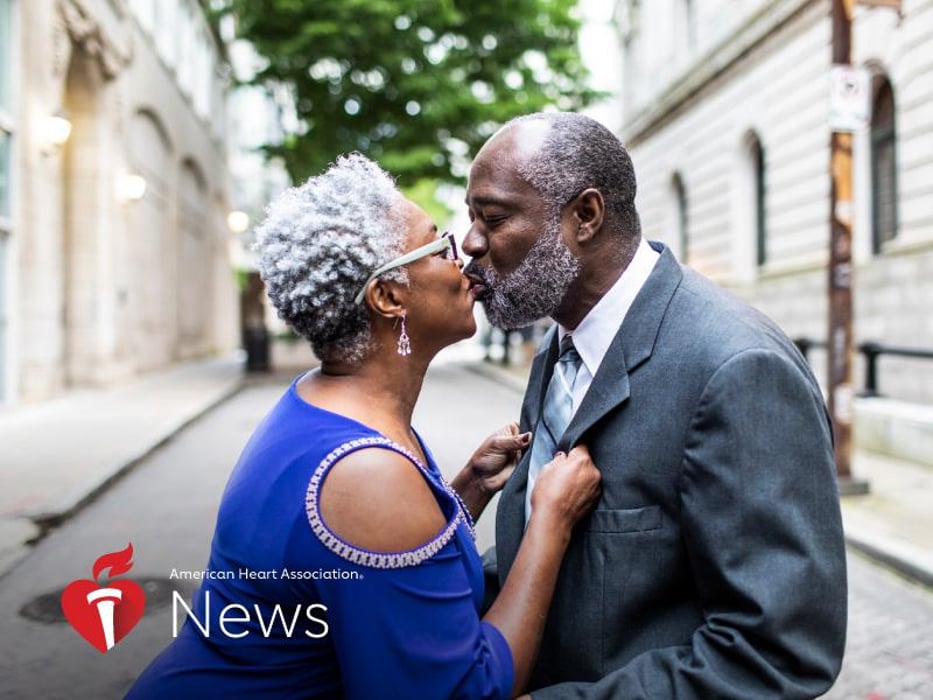AHA News: Want a Healthier Valentine’s Day? More Hugs and Kisses

FRIDAY, Feb. 11, 2022 (American Heart Association News) -- Too much Valentine candy probably won't be good for your health. But the heart-centric holiday's hugs and kisses are a different story.
"We crave social connection and human touch," said Ashley Thompson, a social psychologist and associate professor at the University of Minnesota Duluth. "Hugging and kissing are a big part of that, and we know they're incredibly beneficial for many reasons."
First, the caveats: Both people in the equation must completely agree with the interaction. And whether in flu season or during an enduring pandemic, be careful with whom you're sharing germs.
But if all those conditions are met, said Kory Floyd, professor of communication at the University of Arizona in Tucson, "expressions of affection don't just feel good psychologically or emotionally, they're intervening in our physiology."
Besides burning a few calories a minute, kissing may be good for heart health. A 2009 study published in Western Journal of Communication divided couples into two groups, one of which was instructed to step up their romantic kissing. After six weeks, the enhanced kissers reported less stress, more satisfying relationships – and lower cholesterol. Other research shows cuddling with your significant other may lower blood pressure.
The keys to positive results, said Floyd, who studies the effects of affectionate behavior, are hormones.
"When we share affection with somebody, it lowers our stress hormones," he said. "One of them is cortisol, which comes from the adrenal glands. When we're stressed out, our cortisol level is elevated, and affection can bring them back to the baseline level. It can also lower blood pressure and heart rate if those are elevated."
Hugging and kissing get the brain involved as well. "That releases oxytocin, which helps facilitate bonding," Thompson said. "The more oxytocin, the stronger the bond we're going to have with our partner. Without the oxytocin, we can't build those connections." That's why oxytocin is commonly referred to as the cuddle chemical, she said.
Human touch and kissing also can produce higher levels of dopamine, a hormone that creates feelings of reward and pleasure. "It's like a happy drug," Thompson said.
Take away that affection, Floyd said, "and people don't sleep as well. They're in more physical pain and are more susceptible to secondary immune disorders, depression and other mood disorders."
A 2020 report from the National Academies of Sciences, Engineering, and Medicine underscored that point, noting that older adults who are isolated or lonely may have a higher risk of heart disease and depression.
Other research published in 2014 in Psychological Science assessed more than 400 adults for their stress levels and how often they received hugs. Then they exposed them to the cold virus. The hug-deprived people got sick more often and more seriously than those who reported lots of hugs.
While affection may be a great prescription, Floyd said, there's no recommended daily dose.
"We don't all need the same amount of sleep or to eat the same amount to be healthy," he said. "We don't all need the same amount of affection to feel fulfilled and connected. But just like with sleep and food, everybody needs some."
The pandemic, when many people have been isolated and quarantined for long periods, has reinforced the importance of physical contact.
"People went through a big withdrawal," Thompson said. "I guess the silver lining was it forced us to get creative."
Floyd agreed. "People who already felt affection-deprived certainly suffered a great deal, but people who weren't deprived before were really missing it," he said. "At least now we have Zoom and FaceTime and all these technologies to help us keep those affectionate bonds."
Still, he said, "there's something special about tactile contact – handholding, kissing, hugging, putting your arms around somebody. Those are more health supportive than any others. And the one thing we couldn't do was reach through that computer screen."
American Heart Association News covers heart and brain health. Not all views expressed in this story reflect the official position of the American Heart Association. Copyright is owned or held by the American Heart Association, Inc., and all rights are reserved. If you have questions or comments about this story, please email editor@heart.org.
By Michael Precker
Related Posts
1 in 3 U.S. Public Health Workers Feels Threatened During Pandemic
WEDNESDAY, Jan. 25, 2023 (HealthDay News) -- One-third of public health workers...
Cómo la pandemia de COVID empeoró la epidemia de opioides, aunque la telesalud ayudara
VIERNES, 1 de octubre de 2021 (HealthDay News) -- La pandemia de COVID-19 ha...
Digestive Diseases Can Take Toll on Seniors’ Mental Health
THURSDAY, Sept. 14, 2023 (HealthDay News) -- A lot of older adults have...
Current Monkeypox Outbreak Is Showing Different Symptoms
FRIDAY, July 29, 2022 (HealthDay News) -- The monkeypox illness now spreading...
